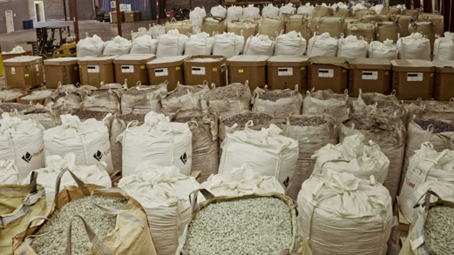
The Need: There’s mounting tension between the needs of a growing world population and the limits of our natural resources. Take plastic. Each year, 300 million tons of plastic are produced globally. Yet only 16% of that plastic is collected for recycling, and only 12% is actually recycled. Of the remaining waste, 25% gets incinerated, 40% goes to landfills, and 19% ends up in unmanaged dumps or littering the environment.
Mechanical recycling is a very effective, environmentally friendly process that should be used whenever possible. However, these processes are geared towards the most commonly used packaging articles. Advanced recycling is key to expanding what can be recycled. For example, non-bottle PET or even opaque PET applications could be easily recycled using advanced recycling technologies.
The Solution: Through Eastman’s molecular recycling technologies, also known as chemical or advanced recycling, we are creating value from waste. We have two types of molecular recycling technologies – carbon renewal and polyester renewal. These technologies break down hard-to-recycle plastic waste into its molecular building blocks so it can be reused over and over again—diverting waste from landfill and creating new, sustainable materials without compromise.
What makes it particularly smart or circular? These molecular recycling technologies are not a pipedream – they are operating at scale today.
In 2020, we commercialized two technologies that transform plastic waste into valuable raw material for high quality polymers with lower greenhouse gas emissions than the fossil process. Products like Tritan™ Renew and Cristal™ Renew are available today.
In addition, we also launched Naia™ Renew, cellulosic fibers produced from 60% sustainably sourced wood pulp, using our carbon renewal technology, one of the two types of molecular recycling technologies.
Now, we are investing $250 million dollars to expand capacity and enable more brands and consumers to choose a better future. This state-of-the-art facility will use more than 110,000 metric tons of waste plastic as raw material annually. As a result, the same amount of fossil feedstock will remain in the ground.
Results, Benefits, and Outcomes to Date: We are still on track for our new molecular recycling facility to be complete in 2022.
We continue to partner with over 25 brands as they incorporate our Renew materials into their products, enabling them to meet their sustainability goals.
Key takeaways:
– No single solution will solve the world’s plastic pollution and climate challenges. It’s going to take all of us working together to help the plastic waste crisis.
– We need smart policies to speed adoption – such as – 1. Ensure advanced recycling is included into policy as a viable recycling option. 2. Include an accepted definition of mass balance in legislation and regulations. 3. Expand infrastructure through incentives, mandates, and investment. (Can read more in our whitepaper at eastman.com/advocacy)
Which of the Pact’s 4 Targets does your work help achieve? Eastman’s advanced recycling technologies will help achieve Target 3: Undertake ambitious actions to effectively recycle or compost 50% of plastic packaging by 2025.
Additionally, our technologies will enable both Target 2: 100% of plastic packaging will be reusable, recyclable, or compostable by 2025, by allowing more types of plastics to be recyclable, as well as Target 4: By 2025, the average recycled content or responsibly sourced bio-based content in plastic packaging will be 30%, by producing resins with recycled content and/or responsibly sourced biobased content.
How are you communicating your success? We just published the first of many of our Success Stories on our website at https://www.eastman.com/Company/Circular-Economy/Success-Stories/Pages/Success-Stories.aspx
We also communicate our latest events via press releases (found at https://www.eastman.com/Company/Circular-Economy/Resources/Pages/News.aspx) and our quarterly circular economy newsletter called The Materials Revolution (you can sign up to receive at https://info.eastman.com/CircEconNewsletterSub.html)
Quote: “I am fueled by this new paradigm that I’m going to work every day to literally work on changing the world. I’ve never been able to say that. It’s an awesome feeling! What we’re doing here at Eastman, working on figuring out how to process waste plastic and clean up landfills and keep waste out of oceans…it’s monumental. We’re a small part of fixing the problem, but we’re fixing the problem nonetheless. And I’m not the only one that can say that. There are hundreds of people across Eastman that have been working on this, and it is so great to be able to get up in the morning and think, ‘Man what I’m doing is really going to have an impact on the world and our kids.'” – Jayme Leita, Director of Circular Economy Integration, Eastman Chemical Company